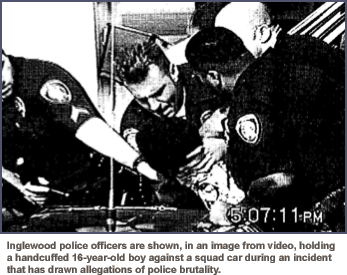

The roots of brutality
Police violence is not just a black and white issue
 The recently televised videotape showing a handcuffed black teenager being pummeled by a white police officer in Inglewood, Calif., would appear, at first glance, to be another incident of racist police brutality, even drawing comparison to the 1992 Rodney King beating. The police officer involved surrendered and was indicted by a grand jury last week.
The recently televised videotape showing a handcuffed black teenager being pummeled by a white police officer in Inglewood, Calif., would appear, at first glance, to be another incident of racist police brutality, even drawing comparison to the 1992 Rodney King beating. The police officer involved surrendered and was indicted by a grand jury last week.
But a closer look at the videotape provides a more disturbing image. In the foreground is what appears to be an African-American police officer apparently doing nothing to stop his colleague from assaulting the youth. In addition, there appears to be at least one other minority officer in the video who also is doing nothing to stop the violence. By their failure to act, they are, in effect, condoning the actions of the abusive police officer. Does that make them racist as well? The answer is maybe yes, maybe no, but no matter what the underlying motivation, it is obviously wrong and brings to the forefront a serious yet overlooked aspect of this problem: Police brutality often transcends and is based upon something more than mere racism. Contrary to public thinking, alleged police brutality is no a simple black and white issue. Nor do most of the perpetrators of police brutality see themselves as racists in any way, even when they have been charged and found guilty of engaging in such conduct. As a former Hudson County assistant prosecutor who has worked closely with police officers and lectured at several police academies, I can say this is not an uncommon situation. Why does police brutality continue to be so rampant? There are two reasons. First, police officers, especially minority officers, who privately may be offended by the use of excessive force, are afraid to complain. To do so would be seen as an act of betrayal to the police brotherhood and a violation of its "code of silence." Violators can expect isolation and retaliation, including being fired based upon trumped-up charges. Being isolated by their peers also poses a hazard. They are in need of the support structure to protect them when their lives are in danger. No one wants his backup to be purposely slow to respond because he is perceived as a troublemaker. This dangerous message is loud and clear, and regrettably delivered early in the police training process. Anyone who denies its existence is whether a fool or a liar. Second, and perhaps more important, is the us (police)-vs.-them (anyone who is not the police) mentality that police training and culture instill, particularly in dangerous situations. In such instances, this training, and the constant inculcation regarding the brotherhood, transcends and blurs racial distinctions among police officers. Individuals identify more as police officers than as members of a specific racial group. They are the "good guys" going after the "bad guys." That is why some of the most vicious and violent police officers are surprised at being called to task. They perceive what they are doing as proper and desirable, especially when they are members of a department with a "paper tiger" or ineffective internal affairs process. Often internal affairs shields and protects errant police officers, which presents more of a danger to the public than having no internal affairs process at all. The fact that these California police officers felt at liberty to do what they did in daylight and in a public place shows me that the department has a custom, practice and policy of being deliberately indifferent to civil rights. Usually, this is because of inadequate training and failure of their superiors to punish transgressors.  While, thankfully, the overwhelming majority of police officers in northern New Jersey are model public servants, unfortunately instances of police brutality sometimes occur here, too. Our law firm has handled more than two dozen police brutality cases in this region, mostly going after errant cops, but also defending them in some limited situations.
While, thankfully, the overwhelming majority of police officers in northern New Jersey are model public servants, unfortunately instances of police brutality sometimes occur here, too. Our law firm has handled more than two dozen police brutality cases in this region, mostly going after errant cops, but also defending them in some limited situations.
From our experience one thing is clear: Police departments that do not aggressively investigate complaints of police brutality and racial profiling aggressively and honestly deliver a clear message to the offending officers that their actions are condoned, encouraged and protected. It really is as simple as this. The departments that fairly evaluate complaints of police have a higher statistical number of "sustained" complaints usually have police officers who are mindful that any conduct unbecoming a police officer will be met with significant sanctions. In these departments, you see a far more professional and responsible police force. These departments have learned the most valuable lesson - that it is possible to be tough on crime and be sensitive to the civil rights of the citizenry. Too often, these concepts are seen as opposites. To be fair, most police departments strive - at least in theory - to educate themselves to better handle these complex issues. That is a start. There are, however, many departments that don't want to change. We have represented minority police officers in this community who were brave enough to bring these issues of police brutality and racism to the forefront of their departments, honorably violating the code of silence. So what happened? Instead of having their complaints investigated, they lost their jobs, falsely charged with minor bogus infractions. Meanwhile, other officers with far more serious infractions, even of a repeated criminal and violent nature, remain on the force without even a day's suspension. These officers continue to pose a danger to the public they are supposed to protect. Robert Bianchi, a partner in a Bloomfield law firm, is a former Hudson County assistant prosecutor who has worked closely with police officers and lectured at the Port Authority and Jersey City Police academies.
|
||||
 |
 |
|||